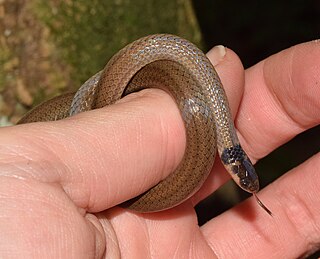
Sibynophis subpunctatus, commonly known as Duméril's black-headed snake or Jerdon's many-toothed snake, is a species of nonvenomous colubrid snake endemic to Bangladesh, India, Sri Lanka, and Nepal.

Günther's black snake is a species of poorly known lamprophiid snake endemic to central Africa. It is the only member of the genus, Bothrolycus. This snake is notable as one of the few snakes with notable sexual dimorphism, as well as possessing a small pit anterior to the eye. While superficially similar to the thermal pits of vipers, its function remains unknown.

Elapotinus is a monotypic genus created for the rear-fanged snake species, Elapotinus picteti. The species is endemic to Madagascar. It is also known commonly as Jan's snake in honor of Italian herpetologist Giorgio Jan. There are no subspecies that are recognized as being valid.
Hypoptophis is a monotypic genus created for the rear-fanged (opisthoglyphous) mildly venomous snake species, Hypoptophis wilsonii. The species, which is endemic to Africa, is in the subfamily Aparallactinae of the family Atractaspididae. There are no subspecies that are recognized as being valid.

Macrelaps is a monotypic genus created for the rear-fanged (opisthoglyphous) venomous snake species, M. microlepidotus, endemic to South Africa. No subspecies are currently recognised.
The Cameroon racer, Poecilopholis cameronensis, is a species of rear-fanged mildly venomous snake endemic to Africa. Poecilopholis is a monotypic genus created for this species.
Aparallactus lineatus, or the lined centipede-eater, is a species of mildly venomous rear-fanged snake in the family Atractaspididae.
Aparallactus niger is a species of mildly venomous rear-fanged snake in the family Atractaspididae. It is endemic to Western Africa.
Polemon acanthias, or Reinhardt's snake-eater, is a species of mildly venomous rear-fanged snake in the family Atractaspididae. It is endemic to Africa.
Polemon barthii, or the Guinea snake-eater, is a species of rear-fanged mildly venomous snake in the family Atractaspididae. The species is endemic to Africa.
Polemon christyi, also known commonly as Christy's snake-eater and the eastern snake-eater, is a species of mildly venomous rear-fanged snake in the subfamily Aparallactinae of the family Atractaspididae. The species is native to Central Africa and East Africa.

Polemon collaris, or the collared snake-eater, is a species of mildly venomous rear-fanged snake in the family Atractaspididae. It is endemic to Africa.
Polemon gracilis, or the graceful snake-eater, is a species of mildly venomous rear-fanged snake in the family Atractaspididae. It is endemic to Africa.
Polemon neuwiedi, called commonly the Ivory Coast snake-eater or Neuwied's polemon, is a species of mildly venomous rear-fanged snake in the family Atractaspididae. The species is endemic to West Africa.

Polemon notatus is a species of mildly venomous rear-fanged snake in the family Atractaspididae. It is endemic to Africa.

Aparallactus capensis, or the Cape centipede-eater, is a species of mildly venomous rear-fanged snake in the Atractaspididae family.

Aparallactus lunulatus, or the reticulated centipede-eater, is a species of mildly venomous rear-fanged snake in the family Atractaspididae, which is endemic to Africa.

Aparallactus modestus, or the western forest centipede-eater, is a species of mildly venomous rear-fanged snake in the Atractaspididae family.
Aparallactus nigriceps, or the Mozambique centipede-eater, is a species of mildly venomous rear-fanged snake in the family Atractaspididae.
Aparallactus werneri, or the Usambara centipede-eater, is a species of mildly venomous rear-fanged snake in the family Lamprophiidae. The species is endemic to Tanzania.








